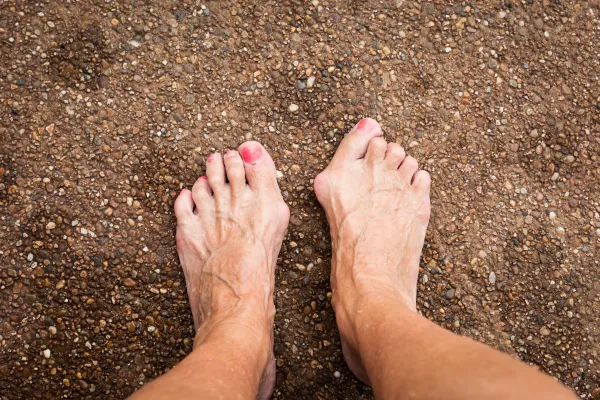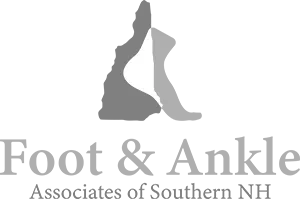Tips & Advice From Foot & Ankle Associates of Southern NH

How Bunion Deformity Affects Your Knees, Hips, and Lower Back: The Connection Between Foot and Joint Health
Bunions are often seen as just a foot problem, but they can cause more than just discomfort in the toes. The effects of a bunion deformity extend far beyond the foot and can have a significant impact on the alignment and function of your knees, hips, and lower back. At Foot and Ankle Associates of Southern NH, we want to help you understand how bunions can influence your entire body and the importance of addressing them early.
What is a Bunion?
A bunion is a bony bump that forms on the joint at the base of your big toe, often caused by the misalignment of the bones in your foot. This misalignment causes the big toe to lean toward the second toe, pushing the joint outward. Over time, bunions can worsen, leading to pain, stiffness, and difficulty wearing shoes.
While the bunion itself is localized in the foot, the pressure and abnormal gait caused by the deformity can affect the rest of your body in a significant way.
The Impact of Bunions on Foot Mechanics
Bunions disrupt the natural alignment of your foot, altering the way you walk. When your big toe is misaligned, the entire structure of the foot is affected. This change in foot mechanics can lead to an imbalance that causes excessive stress on other parts of the body, including the knees, hips, and lower back.
1. Knee Pain
When your foot is misaligned due to a bunion, your body compensates by adjusting the way you walk. This often results in an altered gait that shifts weight unevenly across your knees. Over time, this misalignment can cause increased wear and tear on the knee joints, leading to conditions such as patellofemoral pain syndrome (also known as "runner’s knee") or knee osteoarthritis. The imbalance can also increase the risk of knee sprains or strains due to the added stress.
2. Hip Pain
The misalignment of the foot can affect your hips as well. As your gait changes, your hips may also compensate for the altered movement, resulting in additional strain on the hip joints. This can lead to discomfort, stiffness, and pain, especially in the hip flexors and the lower part of the pelvis. Over time, this can contribute to hip osteoarthritis or other musculoskeletal issues in the hip region.
3. Lower Back Pain
Your lower back is directly connected to the alignment of your feet and legs. When your foot mechanics are altered by bunions, it can affect the alignment of your spine. This shift can lead to lower back pain and discomfort as the spine compensates for the changes in the lower extremities. In some cases, it can lead to sciatica, a condition where the sciatic nerve becomes irritated, causing pain, tingling, and numbness that radiates down the back and legs.
The Chain Reaction: Why Treating Bunions Is Essential
The connection between bunion deformity and pain in the knees, hips, and lower back highlights the importance of early intervention. While the bunion itself may be manageable with the right shoes, custom orthotics, and physical therapy, ignoring the issue can lead to a cascade of musculoskeletal problems in other parts of the body.
Treatment options for bunions may include:
Custom Orthotics: Specially designed insoles can help improve foot alignment and distribute weight evenly across the foot, alleviating pressure on the bunion and minimizing compensation in the knees, hips, and back.
Physical Therapy: Targeted exercises can help strengthen muscles, improve mobility, and correct the altered gait caused by the bunion, reducing stress on the knees, hips, and lower back.
Surgery: In more severe cases, surgery may be necessary to correct the deformity and restore proper alignment. Surgical intervention can help prevent the progression of pain and discomfort throughout the body.
Conclusion
Bunions are more than just a cosmetic issue—they can have a far-reaching impact on your overall health. By addressing the deformity early, you can prevent the onset of knee, hip, and lower back pain, and restore balance and comfort to your entire body. If you’re dealing with bunions or any of the related symptoms, don’t hesitate to contact Foot and Ankle Associates of Southern NH. Our team is here to help you find the right solution for your foot and joint health.
Ask Foot & Ankle Associates of Southern NH And Their Team
Fill in the form to request a call from our team. One of our team members will call you for FREE and answer any questions or concerns you may have about your condition
Where To Find Foot & Ankle Associates of Southern NH

If you have any questions before scheduling an appointment or for general inquiries, please use the contact us button below. Our team will promptly reach out to assist you.
Opening Hours
Monday: 8:00am – 5:00pm
Tuesday: 8:00am – 5:00pm
Wednesday: 8:00am – 2:00pm
Thursday: 8:00am – 5:00pm
Friday: 8:00am – 2:00pm
Saturday: Closed
Sunday: Closed

